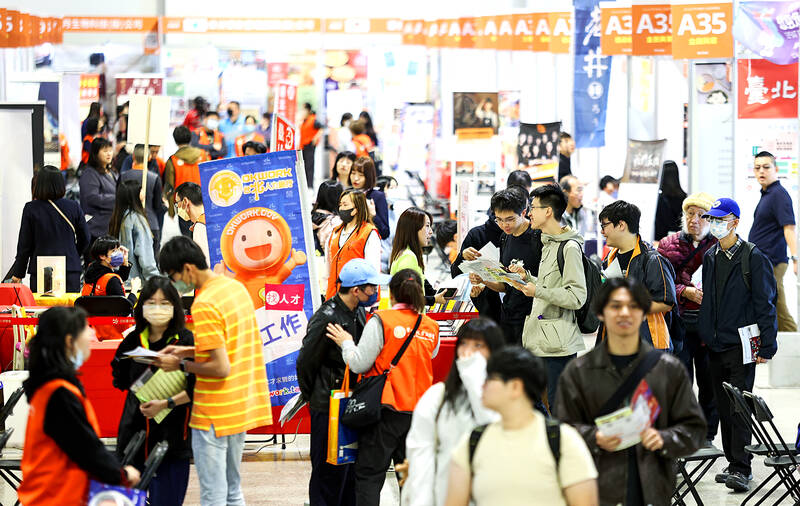Taiwanese employers are signaling steady hiring activity heading into the third quarter, with the healthcare, energy and technology sectors leading in job creation, a quarterly survey by ManpowerGroup showed on Tuesday.
About 36 percent of companies plan to increase headcount next quarter, while 16 percent anticipate cuts and 45 percent intend to hold steady, ManpowerGroup said, citing a survey of 628 Taiwanese employers.
Hiring sentiment is strongest in healthcare and life sciences, as 41 percent more employers are planning to hire than those planning to reduce staff, the survey showed.

Photo: CNA
The trend comes as hospitals and biotech firms are responding to chronic labor shortages and prepare for expanded long-term care services under Taiwan’s long-term care policy to be implemented next year, ManpowerGroup said.
Consequently, demand is rising for frontline nurses, home care workers and interdisciplinary talent in process development and artificial intelligence (AI) applications in medicine, ManpowerGroup analyst Wang Da-wei (王大為) said.
Energy and utilities recorded the second-brightest outlook, as 35 percent of the firms are looking to increase hiring, the survey found.
Domestic firms in these sectors are stepping up campus recruitment to fill research and development, engineering and operations roles, Wang said.
However, recent pullbacks in Taiwan’s offshore wind sector by foreign firms and production capacity cuts underscore the risks of supply chain concentration and weak global demand for green infrastructure, he said.
Information technology remains a key hiring engine, with 29 percent more firms seeking to increase headcount, driven by continued investment in AI and semiconductor manufacturing, ManpowerGroup said.
More than 50 tech companies are expected to release thousands of openings during the graduation season, targeting talent in development, testing and fabrication, it said.
By contrast, hiring activity in the telecommunications sector has slowed, despite ongoing investment in 5G and AI-enabled infrastructure, the survey showed.
Employers are scaling back amid revenue pressure and disruptions from global trade policies, Wang said, adding that the sector remains in a transition phase, focused on restructuring supply chains and modernizing legacy systems.
In terms of regional comparison, Taiwan ranked fifth-strongest in the Asia-Pacific region, behind India, China and Singapore, but ahead of Hong Kong, where employers are the most conservative, ManpowerGroup said.
Global trade uncertainty is shaping hiring decisions for nearly nine in 10 companies, especially for employers in the communication services and information technology industries, it said.
A growing number of companies have focused on automation to handle repetitive tasks, ManpowerGroup said.

Real estate agent and property developer JSL Construction & Development Co (愛山林) led the average compensation rankings among companies listed on the Taiwan Stock Exchange (TWSE) last year, while contract chipmaker Taiwan Semiconductor Manufacturing Co (TSMC, 台積電) finished 14th. JSL Construction paid its employees total average compensation of NT$4.78 million (US$159,701), down 13.5 percent from a year earlier, but still ahead of the most profitable listed tech giants, including TSMC, TWSE data showed. Last year, the average compensation (which includes salary, overtime, bonuses and allowances) paid by TSMC rose 21.6 percent to reach about NT$3.33 million, lifting its ranking by 10 notches

Popular vape brands such as Geek Bar might get more expensive in the US — if you can find them at all. Shipments of vapes from China to the US ground to a near halt last month from a year ago, official data showed, hit by US President Donald Trump’s tariffs and a crackdown on unauthorized e-cigarettes in the world’s biggest market for smoking alternatives. That includes Geek Bar, a brand of flavored vapes that is not authorized to sell in the US, but which had been widely available due to porous import controls. One retailer, who asked not to be named, because

SEASONAL WEAKNESS: The combined revenue of the top 10 foundries fell 5.4%, but rush orders and China’s subsidies partially offset slowing demand Taiwan Semiconductor Manufacturing Co (TSMC, 台積電) further solidified its dominance in the global wafer foundry business in the first quarter of this year, remaining far ahead of its closest rival, Samsung Electronics Co, TrendForce Corp (集邦科技) said yesterday. TSMC posted US$25.52 billion in sales in the January-to-March period, down 5 percent from the previous quarter, but its market share rose from 67.1 percent the previous quarter to 67.6 percent, TrendForce said in a report. While smartphone-related wafer shipments declined in the first quarter due to seasonal factors, solid demand for artificial intelligence (AI) and high-performance computing (HPC) devices and urgent TV-related orders

MINERAL DIPLOMACY: The Chinese commerce ministry said it approved applications for the export of rare earths in a move that could help ease US-China trade tensions Chinese Vice Premier He Lifeng (何立峰) is today to meet a US delegation for talks in the UK, Beijing announced on Saturday amid a fragile truce in the trade dispute between the two powers. He is to visit the UK from yesterday to Friday at the invitation of the British government, the Chinese Ministry of Foreign Affairs said in a statement. He and US representatives are to cochair the first meeting of the US-China economic and trade consultation mechanism, it said. US President Donald Trump on Friday announced that a new round of trade talks with China would start in London beginning today,